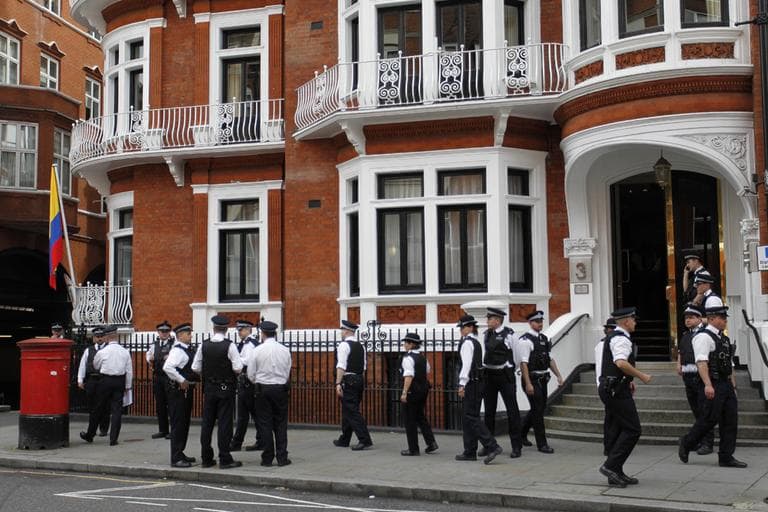Advertisement
Assange Stalemate: Can Britain Raid The Ecuadorean Embassy?
Resume
WikiLeaks founder Julian Assange is still holed up in the Ecuadorean embassy in London, but the international tug-of-war over him continues.
Assange fled to the Ecuadorean embassy in London in June, asking for asylum just as he was about to be extradited to Sweden. Swedish authorities want him in their country for questioning over charges of sexual misconduct. Thursday, Ecuador granted him asylum, but it's not clear how he would get there. Britain says it cannot grant him safe passage because there is a European arrest warrant out for him. And Britain also says it may use an obscure law to revoke the status of the Ecuadorean embassy in London.
Can they do that? Legal expert Jonathan Turley writes yes:
The British threat to raid the embassy is not legally unfounded. There is a common misunderstanding about embassies which are not legally “the soil of the foreign government.” An embassy in London sits on English soil and that country has jurisdiction over it. However, siting on that land is a building occupied with people with diplomatic immunity. As such, it is considered inviolate.
The British government is threatening to use a 1987 British law it says permits the revocation of diplomatic status of a building if the foreign power occupying it “ceases to use land for the purposes of its mission or exclusively for the purposes of a consular post.” The use of the Diplomatic and Consular Premises Act however would trigger an international outcry and beg for acts of retaliations.
The the Vienna Convention on Diplomatic Relations requires diplomats to comply with the laws of the host country and international law does not expressly endorse diplomatic asylum in such cases. That 1961 convention suggests that Ecuador is legally obligated to turn over Assange.
However, countries routinely are faced with such requests — most of which are turned away. However, the United States recently faced this very same dilemma in Beijing when a blind activist fled to our own embassy. Likewise, the U.S. faced this problem when Cardinal Mindszenty took refuge in our embassy in Budapest following the Hungarian uprising in 1956.
- Jonathan Turley: Assange Granted Asylum As Britain Threatens A Raid On Ecuadorean Embassy
- BBC Q & A: Julian Assange and Asylum
- Channel 4: What are Assange's Options?
- NPR: Why Ecuador Granted Assange Asylum
Guest:
- Jonathan Turley, George Washington University professor of law
This segment aired on August 17, 2012.